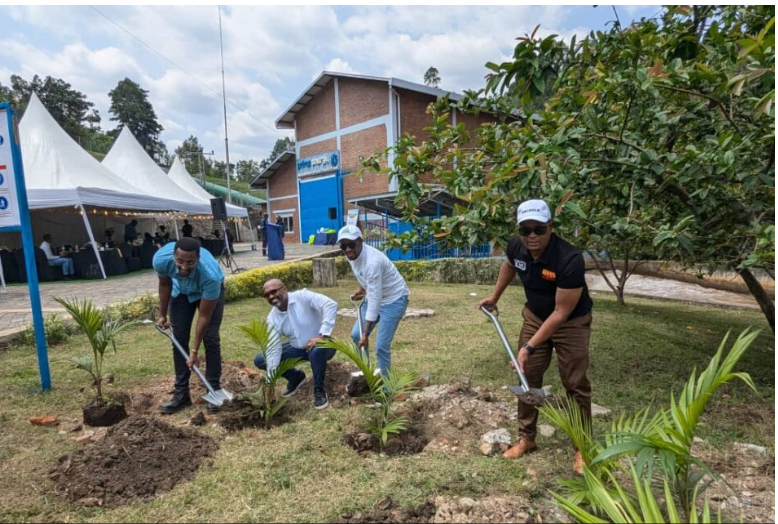Prime Energy, a renewable energy power producer in Rwanda, has called on investors to invest in the country’s first ever green bond that will be injected in a new hydro project plant and financing the maintenance of existing plants.
Currently, Prime Energy operates four hydropower plants located in the Western, Southern and Northern Provinces of Rwanda with 25-year concession agreements with the Government of Rwanda and power purchase agreements (PPAs) with Energy Utility Corporation Limited (EUCL).
The plants generate 8MW and by 2026, the investor plans to commission a 9.76MW hydropower plant (in Rukarara) that will bring the total capacity to 17.4MW to contribute to Rwanda’s ambition to increase access to electricity, renewable and sustainable energy products.

The floated Rwf9.5billion green bond, with a 7-year repayment period, was recently announced to the public and remains open for grabs from 26th September 2024 to 17th October 2024.
The bond, with a minimum investment of Rwf100milliion, features two tranches: The Rwanda Franc (FRW) tranche and the US dollar (USD) linked tranche. The FRW tranche has an interest rate of 13.75% per annum payable semi-annually while the USD tranche has an interest rate of 9.5% per annum payable semi-annually.
On behalf of the Chairman of Prime Energy’s Board of Directors, Sandy Rusera, Prime Energy’s CEO said that securing approval and listing the first-ever green bond in the country provides the company with alternative options of financing through capital markets.
As you consider this investment opportunity, I want to emphasise that Prime Energy’s board is fully committed to protecting investor interests while pursuing our sustainable growth strategy, Rusera said during an Investor Day held at Mukungwa II Hydro Power Plant (HPP) in Musanze this Friday.
He noted that they have put in place rigorous monitoring and reporting mechanisms to ensure that funds raised through this green bond are deployed effectively and in line with international green bond principles.
Prime Energy Chief Operating Officer (COO), Joe Juru Nsano said this investiment will enhance government efforts to reduce the carbon foot print with 80% from diesel sources after the 1994 genocide against Tutsi.
With government efforts, this has been literary reversed and we are close to 80% renewable energy and 20% diesel generators which are just standby and not on-grid or used everytime, Nsano said.
Bank of Kigali (BK) (as an ancor investor) and TDB bank have been particular investors in this development project that is expected to increase hydro energy power sources in Rwanda.
BK Capital, a subsidiary of BK Group PLC has been is the lead financial advisor, sponsor and broker has supported Prime Energy to structure and framework of the bond to meet all the Capital Market Authority (CMA) requirements but also financed the company with $10.6million to renovate the four hydro power plants.
According to BK, that money has been fully repaid and was used to increase the production capacity of these plants by 1.6 times. This bond is green for two reasons. It is going towards Rukarara VI hydro project which is under construction with a production capacity of 9.7 Megawatts, said Siongo Kisoso, the BK Capital Managing Director.
Kisoso said that so far there is growing interest in the bond among local and international investors, because of payment tranches, a good business track record from the issuer, and a proven technology that is sustainable.
To ensure investor money has return on investment, the BPR bank, as the bond trustee, will ensure that the contracts are abided with and payments made on semi-annual basis.
Considering the coupon payments are on a semi-annual basis, the risk of default is reduced and increases investor liquidity (money in flow) because the bondholders are able to receive coupon payments every six months which is a credit enhancement in comparison to a bond that pays once a year or with longer repayment periods.
For sustainable bonds, such as Prime Green Bond, the regulator (CMA) ensures that in addition to the general requirements applicable to issuers of bonds. The issuer produces a sustainability framework which is aligned with international standards and second-party opinion by an independent verifier confirming that the project to be financed is sustainable.
Thapelo Tsheole, the CMA Chief Executive Officer said that there are a few green bonds in Africa and stated that the listing of Prime Energy Green Bond is a milestone for Rwanda, the capital markets and financial sector.
I am proud of this milestone by Prime Energy, as it reflects our collective commitment to sustainable development. At CMA we are dedicated to always supporting businesses to flourish by making profits but also having a positive impact on the environment, Tsheole said.
The development of capital market is essential for mobilizing resources that can drive industry, support infrastructure projects, and contribute to job creation and by connecting investors with entrepreneurs, this can foster a more dynamic and sustainable economy.
RSE Chief Executive Officer, Pierre Celestin Rwabukumba, said that a business growth journey of Prime Energy that has led to floating the first-ever green bond in Rwanda is one way of demystifying the capital markets concept as being for big investors, the elite or for the government.
The story of Prime we heard started modestly, and I could consider Prime as an SME company that keeps growing over the years and has decided to look to the capital markets to raise long term financing, Rwabukumba said.
Using this example of Prime, Rwabukumba said: We have now come to a point where we must demystify capital markets if a company like prime energy can raise Rwf9.5billion through the stock markets by issuing a debt instrument -and the first ever green bond in Rwanda With this milestone, Rwabukumba revealed that the stock markets have moved from two transactions per quarter to be able to raise in the recent two months over Rwf100billion in fixed income, and that another green bond is underway in agro processing domain.
Ennywealth




